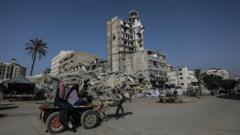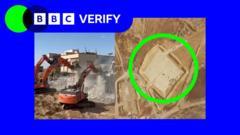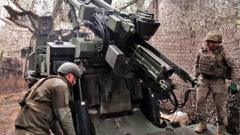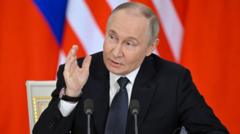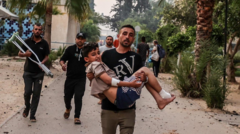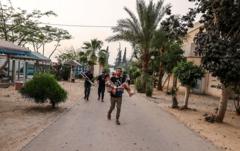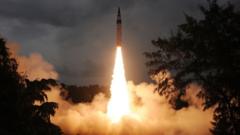A recent escalation of violence in Gaza results in significant casualties, drawing international condemnation and calls for urgent humanitarian action.
**Escalation in Gaza: Israeli Strikes Claim 80 Lives Amid Growing Humanitarian Crisis**
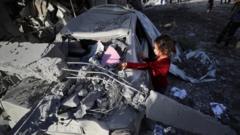
**Escalation in Gaza: Israeli Strikes Claim 80 Lives Amid Growing Humanitarian Crisis**
Destructive air strikes in Gaza leave many dead, federal officials and hospitals report a dire situation.
In a harrowing escalation of violence, at least 80 individuals have been reported killed due to Israeli airstrikes across Gaza, as hospitals and first responders provide updates on the tragic impacts. The Indonesian hospital reported that the toll includes 22 children and 15 women, with many lives lost when several homes in the northern Jabalia region were hit overnight. Al-Awda hospital reported receiving nine additional bodies, predominantly children, amid the onslaught.
The Israeli military noted its operations aimed at targeting fighters from Hamas and Palestinian Islamic Jihad in the northern regions, asserting that they had provided evacuation warnings to Jabalia’s residents following recent rocket attacks aimed at Israel. The UN's humanitarian chief, Tom Fletcher, condemned the strikes while urging the UN Security Council to intervene to prevent what he referred to as genocide against the Palestinian population. Fletcher criticized Israel's blockade on Gaza, calling for its immediate lifting and denouncing the proposed private distribution of humanitarian aid as a smokescreen for further violence.
Eyewitness accounts from Jabalia described rampant fear and chaos, with residents reporting multiple explosions and the devastating aftermath. A witness recounted discovering mangled body parts scattered among the rubble of a destroyed home, including those of a two-month-old baby. Hospitals in the area, already under tremendous strain from ongoing shortages of medical supplies and fuel, struggled to accommodate the influx of injured patients as department closures ensued due to power outages.
The strikes marked a continuation of violence which has escalated since the collapse of a two-month ceasefire in early March. The UN reported that around 20% of Gaza’s population has recently been displaced again, with over 70% now residing in areas designated as "no-go" zones by Israel. Humanitarian conditions have become increasingly intolerable, with food and fuel supplies critically low, leading to the suspension of essential services across the region.
Despite the deteriorating humanitarian situation, Israeli officials maintained their stance, expressing that military actions are a response to Hamas’s continued attacks. The Israeli military reiterated its commitment to conducting airstrikes while attempting to minimize civilian casualties. New evacuation orders were issued for areas with suspected Hamas activities, further complicating the already dire living conditions for Gaza’s civilians.
In an apparent effort to foster dialogue and potentially negotiate a ceasefire, Hamas recently released an American hostage. U.S. President Donald Trump voiced hope for the liberation of more hostages at a Gulf leaders' summit, while Israeli officials discussed ongoing strategies to deal with hostage situations in relation to the broader conflict.
As the situation continues to escalate, Israeli Prime Minister Benjamin Netanyahu declared an unwavering commitment to eradicate Hamas, firmly stating that scaling back military operations isn't an option, while emphasizing the imperative of national security. As hostilities persist, the humanitarian crisis in Gaza deepens, raising urgent calls for international intervention to restore peace and safeguard civilian lives.
The Israeli military noted its operations aimed at targeting fighters from Hamas and Palestinian Islamic Jihad in the northern regions, asserting that they had provided evacuation warnings to Jabalia’s residents following recent rocket attacks aimed at Israel. The UN's humanitarian chief, Tom Fletcher, condemned the strikes while urging the UN Security Council to intervene to prevent what he referred to as genocide against the Palestinian population. Fletcher criticized Israel's blockade on Gaza, calling for its immediate lifting and denouncing the proposed private distribution of humanitarian aid as a smokescreen for further violence.
Eyewitness accounts from Jabalia described rampant fear and chaos, with residents reporting multiple explosions and the devastating aftermath. A witness recounted discovering mangled body parts scattered among the rubble of a destroyed home, including those of a two-month-old baby. Hospitals in the area, already under tremendous strain from ongoing shortages of medical supplies and fuel, struggled to accommodate the influx of injured patients as department closures ensued due to power outages.
The strikes marked a continuation of violence which has escalated since the collapse of a two-month ceasefire in early March. The UN reported that around 20% of Gaza’s population has recently been displaced again, with over 70% now residing in areas designated as "no-go" zones by Israel. Humanitarian conditions have become increasingly intolerable, with food and fuel supplies critically low, leading to the suspension of essential services across the region.
Despite the deteriorating humanitarian situation, Israeli officials maintained their stance, expressing that military actions are a response to Hamas’s continued attacks. The Israeli military reiterated its commitment to conducting airstrikes while attempting to minimize civilian casualties. New evacuation orders were issued for areas with suspected Hamas activities, further complicating the already dire living conditions for Gaza’s civilians.
In an apparent effort to foster dialogue and potentially negotiate a ceasefire, Hamas recently released an American hostage. U.S. President Donald Trump voiced hope for the liberation of more hostages at a Gulf leaders' summit, while Israeli officials discussed ongoing strategies to deal with hostage situations in relation to the broader conflict.
As the situation continues to escalate, Israeli Prime Minister Benjamin Netanyahu declared an unwavering commitment to eradicate Hamas, firmly stating that scaling back military operations isn't an option, while emphasizing the imperative of national security. As hostilities persist, the humanitarian crisis in Gaza deepens, raising urgent calls for international intervention to restore peace and safeguard civilian lives.







